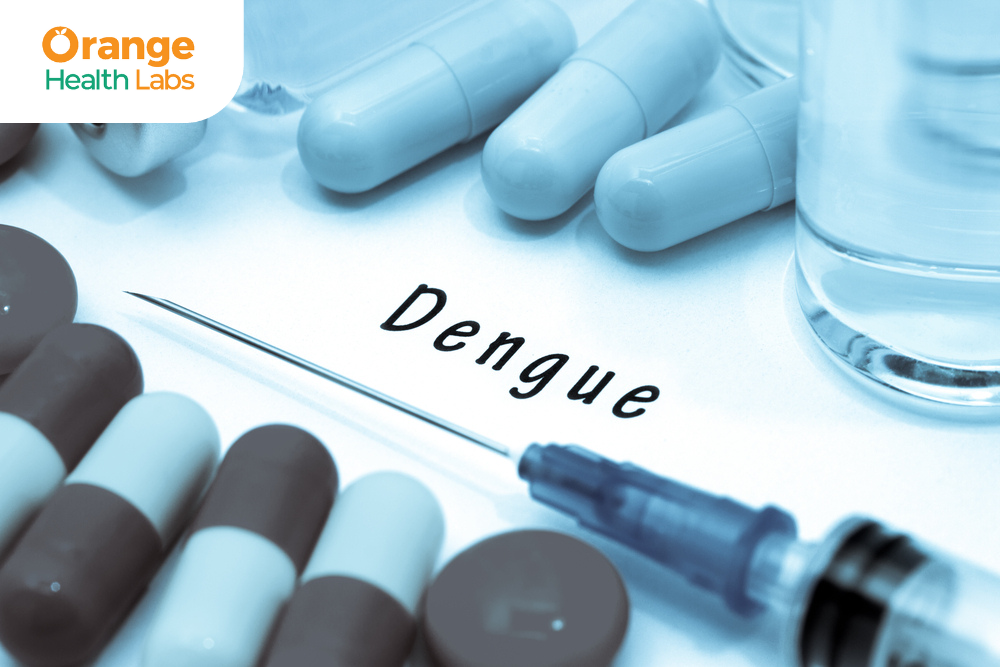Search for tests or checkups
SupportThe Importance of Blood Tests in Dengue Diagnosis

Dengue is a viral illness spread by infected mosquitoes. It affects people of all ages and can range from mild fever to severe symptoms like high fever, headache, body aches, and rashes. Severe cases can lead to shock, bleeding, and organ complications.
Accurate diagnosis of dengue is crucial for several reasons. It helps doctors confirm if someone has dengue, distinguish it from other diseases with similar symptoms, and identify severe cases early. Accurate diagnosis also helps public health officials track and control outbreaks, understand how the disease develops, conduct research, develop vaccines, and test new treatments. Overall, it ensures that patients receive the right care and helps prevent the spread of the disease.
The Significance of Blood Tests in Dengue Diagnosis
Dengue Blood tests play a crucial role in diagnosing and managing dengue fever. They help confirm the presence of the virus, assess its severity, guide treatment decisions, and monitor the patient's health.
The different types of blood tests used for diagnosing dengue assess the presence of viral particles in the blood, check for antibodies in the blood produced against the dengue virus, and evaluate the count of blood cells. These tests include:
- Dengue NS1 Antigen Test: This test detects the presence of the NS1 antigen, a protein produced by the dengue virus early in infection. A positive NS1 antigen test indicates acute dengue infection.
- Dengue Serology (IgM and IgG Antibody Test): These tests detect the presence of antibodies produced by the immune system in response to dengue infection. IgM antibodies are produced early in infection, while IgG antibodies are produced later and persist for a longer.
- Complete Blood Count (CBC): This test counts the red blood cells, white blood cells, and platelets in the blood. In dengue fever, a significant decrease in the platelet count is often observed, which is known as thrombocytopenia.
- Coagulation Profile: This tests the blood's clotting capacity. In severe cases of dengue fever, clotting problems can occur, leading to an increased risk of bleeding.
Overall, blood tests are indispensable tools in the diagnosis and management of dengue fever, ensuring that patients receive timely and appropriate care.
Key Blood Markers in Dengue Diagnosis
Dengue fever is diagnosed using several key blood markers that help identify the presence and progression of the disease. These markers include the NS1 antigen, IgM antibodies, IgG antibodies, platelet count, and hematocrit levels.
- NS1 Antigen: The NS1 antigen is a protein produced by the dengue virus early in the infection. Detection of the NS1 antigen in the blood indicates an acute dengue infection. This test is most accurate within the first week of symptoms and is commonly used for early diagnosis.
- IgM Antibodies: Immunoglobulin M (IgM) antibodies are produced by the immune system in response to a dengue infection. IgM antibodies are detectable after about five days of symptoms and indicate a current dengue infection. However, they do not specify the virus type.
- IgG Antibodies: Immunoglobulin G (IgG) antibodies are produced later in the infection and can persist for a long time, indicating a past or recent dengue infection. IgG antibodies can help determine whether the infection is primary (first-time) or secondary (reinfection).
- Platelet Count: In dengue, the platelet count commonly drops, causing thrombocytopenia (low platelets). Platelets help blood clot, so a low count can cause bleeding. Monitoring platelets between day 3 and day 8 is crucial, as severe drops can lead to bleeding complications.
- Haematocrit Levels: Haematocrit measures how much space red blood cells take up in the blood. In severe dengue, plasma fluid leaks out of blood vessels into tissues, making the blood thicker. This thickening can raise the haematocrit levels, indicating a more serious form of the illness.
These markers are crucial for diagnosing and managing dengue fever, providing insights into the virus's presence and impact on the body.
How Blood Tests Aid in Effective Dengue Management
Blood tests are important for dealing with dengue fever. They help doctors confirm if someone has dengue and understand how the illness is progressing. Here's how they help:
- Confirming Dengue: These tests make sure that the illness is actually dengue and not something else.
- Guiding Treatment: Doctors use the results of these tests to decide on the best treatment for dengue fever.
- Educating Patients: Knowing for sure that it is dengue, helps patients understand the illness better. It also helps them follow the doctor's advice on how to prevent mosquito bites and stop the virus from spreading.
- Monitoring the Illness and Recovery: These tests show how the illness is progressing and if the person is getting better. They also help doctors know if any complications need attention.
- Identifying Dengue Epidemics: Widespread testing can help identify dengue cases at the community level, so steps can be taken quickly to stop it from spreading.
Other Diagnostic Methods and Their Comparative Importance
Other diagnostic methods for dengue fever include virus isolation and nucleic acid detection. Here's what these diagnostic methods include:
- Virus Isolation: This method involves collecting samples from the blood early in the infection to find the virus. The virus is grown in cell cultures and checked for signs of infection, which can take 1-2 weeks. While useful, this method is time-consuming and may not be practical for rapid diagnosis.
- Nucleic Acid Detection: Nucleic acid tests like RT-PCR detect the genetic material of the virus. These tests are very sensitive and can detect the virus even when there are few copies present. However, these tests require special machines and are expensive.
While these methods are important, doctors often prefer blood tests like antibody tests for their ease and reliability. NS1 antigen testing is also commonly prescribed as it is quite accurate, can be conducted fairly rapidly, and at a lower cost than other virus detection methods. Although each method has its pros and cons, using a combination of tests helps doctors diagnose dengue accurately.
Challenges in Dengue Diagnosis
Diagnosing dengue fever can be challenging because the tests we use sometimes give results that are hard to understand or not completely accurate. Here's why:
- Misinterpretation: The tests for dengue, like the NS1 antigen test and antibody tests, can sometimes show that someone has dengue when they actually don't, or they might miss the dengue virus when it's there (false positive or false negative results). This can lead to doctors making the wrong diagnosis or taking longer to figure out what's wrong, which can affect how well the patient is treated.
- Timely and Repeat Testing: Dengue symptoms can look like other illnesses, so it's important to test for it early and sometimes more than once to be sure. This is especially true in the beginning when the infection is new. Getting the timing right for these tests is crucial to making sure people get the right treatment.
To solve these problems, we need better tests that give clearer and more accurate results. Scientists and doctors are working on this to make sure we can diagnose dengue fever more effectively. In the meantime, doctors need to be careful and use clinical judgment when diagnosing dengue.
Conclusion
Blood tests are essential for diagnosing and managing dengue fever, helping confirm the virus, assess its severity, guide treatment, and monitor progress. These tests are especially important during dengue outbreaks, as they enable early detection and timely treatment. Early detection can help prevent the spread of the disease and ensure proper care for those affected. Overall, blood tests are essential tools in the fight against dengue fever. They help save lives by enabling early diagnosis and treatment.
Book Dengue Test in your city: Dengue Test in Mumbai | Dengue Test in Bangalore | Dengue Test in Noida | Dengue Test in Hyderabad | Dengue Test in Gurgaon | Dengue Test in Faridabad | Dengue Test in Delhi

Vitamin D and Scoliosis: Uncovering the Hidden Connection

Unlocking Heart Health: The Power of Complete Health Checkups
